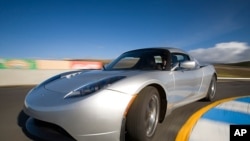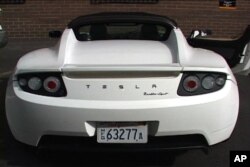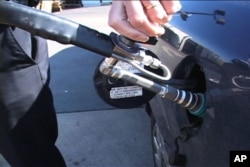There's only one way to describe the new Tesla Roadster automobile.
Hot. Hot and green. That's because the Tesla is an all-electric car.
"I think people feel really good about driving a vehicle that is also very socially responsible," says Tari Cash, a Tesla Motors spokesperson. "Something that's fun, something that looks good, but also something that can make them feel like they're really contributing to making the world a better place."
The Tesla Roadster doesn't just look great. It can go more than 400 kilometers on a charge, and has all the torque of a 500-horsepower Corvette. The Tesla rockets from 0 to 100 kilometers per hour in less than four seconds. By any measure, that's one fast car.
"The car is made out of carbon fiber," says Cash. "That's unique to this vehicle, it makes the vehicle very light, which helps out with the performance. The hardest thing is not to get a speeding ticket."
The Tesla takes its name from inventor Nikola Tesla, one of the early pioneers of electrical power. In addition to being a great looking car, the Roadster - despite its size - has ample storage room for a weekend getaway.
"You have enough storage space to fit actually two golf bags, one on top of the other, so you can absolutely fit weekend bags and travel with this vehicle for the weekend," says Cash.
The Roadster does have its drawbacks, though, starting with the price: more than 100-thousand dollars. But starting in 2011, Tesla Motors will offer a roomier, more family friendly car at half the price, the Model S. "It's a very practical sedan for a family," says spokesperson Tari Cash. "It's a 7-seater and will seat five adults and two children."
Experts say electric cars are destined to play an important part in the global push to ease carbon emissions. But in some cases, electric power just does not have the long distance hauling capacity needed by truckers.
"25 percent of the energy we use on the road in the United States is for big trucks and buses," notes Richard Kolodziej, president of the International Association for Natural Gas Vehicles. "We really have to get those trucks and buses to use something other than petroleum."
Natural gas vehicles are not new. Vehicles running on compressed natural gas have been around for decades, just not in large numbers as compared to gasoline-powered cars. However, Kolodziej says that's changing.
"The leading country is Pakistan, they have got 225-thousand natural gas vehicles. Nigeria has a huge natural gas resource base."
Natural gas is cleaner than petroleum and can be less expensive. But Honda is the only car manufacturer to offer a natural gas sedan to consumers in America, and in only a few states. Public natural gas fueling stations are few and far between, so most people would need to refuel such a vehicle at home.
Says Kolodziej, "America has 180-thousand gasoline stations. To replicate that would an impossibility in the short term. Our focus is on fleets that are called 'return to home' vehicles. Vehicles that go out in the morning, do their business, and come back."
Experts say it is difficult to predict which vehicle, natural gas, electric, or some other alternatively fueled vehicle, will come to dominate the roadways of the world. But engineers such as those at Tesla are working on a next generation of transportation.
You can watch this, and all Rebecca Ward's "Going Green" reports here.






